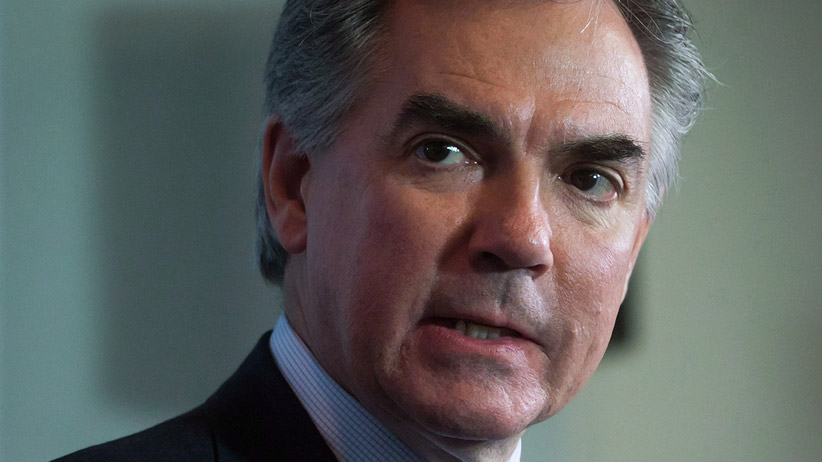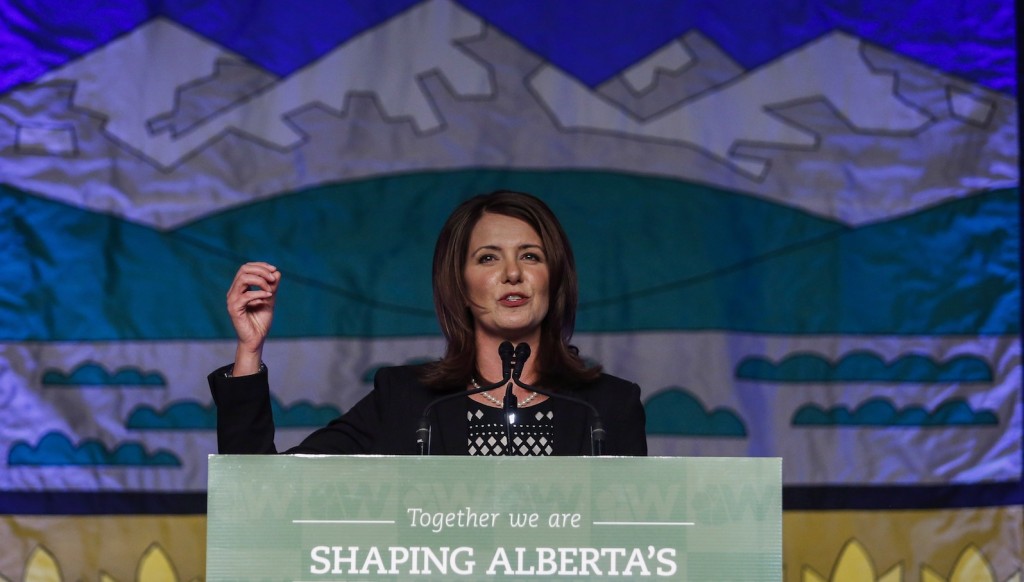Behind the uproar in Alberta
Colby Cosh on the ad-hoc, crazy-quilt nature of an inevitable revolt in Alberta
Share

The scenario: Roughly half of the official Opposition, including its leader, quits its party and crosses the floor to join a government that already has an overwhelming majority in the assembly. It appears that’s what’s going to happen in Alberta on Wednesday, and it is difficult to find any precedent for it—outside the Third World, one hesitates to add. Major opposition figures will often dart back and forth across the two-sword divide in parliamentary democracies that suffer (or are designed for) numerical instability. Alberta, which has never come close to minority government in 109 years of history, is the opposite of this.
A couple of weeks ago, the strongest opposition in the history of the province’s assembly shamed the government into suspending a bill on anti-bullying measures in schools. Together, the minority parties split the governing caucus, introducing cracks that have not yet finished spreading, and demonstrated that its appreciation of public sentiment was probably much better than the government’s. (What in the ever-loving Lake of Fire is the Prentice government going to do about Bill 10, whose supporters outside the Assembly are now rallying after being shamed into silence during the actual debate? I don’t think they have any idea.)
The Wildrose members played a leading role in this victory. Somehow it became a cue for their caucus to self-destruct.
It’s a fascinating, surprising thing—but not entirely a mystery. Ever since Jim Prentice parachuted into Alberta politics to save the governing Progressive Conservatives, the Wildrose Party has been suffering an acknowledged identity crisis. It was initially created by Old Reformers seeking to replace the tiny hobby parties that were constantly winking in and out of existence on the right of the PCs during the 1990s. When Danielle Smith took over, bringing some Conservative Party of Canada organizing talent with her, these evangelical populists were joined by great numbers of libertarian types aghast at the loss of the government’s fiscal discipline, its increasing propensity for bribing public-sector unions, and the improvisational nature of its policymaking. Ed Stelmach alienated the oil patch with his resource-royalty adjustments; Alison Redford alienated everybody.
But the ad-hoc, crazy-quilt nature of this revolt was always apparent. It’s apparent in the meaningless name of the party itself: It was apparent in the tragedy of the 2012 election, wherein the PCs successfully turned the Wildrose’s Old Reformer streak against its gay-friendly, pro-choice leader. Smith realized after the defeat that she needed to turn the Wildrose into something that had an actual identity: Pinocchio had to become a real boy. A few months ago, she made an appeal to Wildrose members to, essentially, love one another, concentrate on winning, and stop bickering so much at board meetings. It makes quite a political epitaph:
I am asking you to start being kinder to each other and make Wildrose events a fun place to be. Enjoy each other. Do things together. Have a monthly beer-and-wings night. Hold a Christmas social. Do a Christmas cookie exchange. Hold a potluck. Sing Christmas carols door to door. Make your Wildrose board members your friends and plan to do your board business around doing something fun before or after your monthly board meetings. Appoint one of your board members to be the official Fun Police. It is their job to ensure that Wildrosers want to come out and want to bring their friends out, too. TELL YOUR CHILI STORY.
The chili stories are destined to go untold. People who were in the party long before Smith never cottoned to the CPC operatives who, up to the climax of the drama, kept the Wildrose ahead of the Progressive Conservatives in fundraising. They didn’t like Tom Flanagan’s civil-libertarian ruminations on child pornography, and they probably weren’t super pumped about Smith’s remarkable intervention on behalf of gay-straight alliances in the Bill 10 debate. Imagine you are Danielle Smith, and the Progressive Conservatives are imploring you to cross the floor, exercise power and authority, and implement your own agenda. Meanwhile, your own party doesn’t seem too certain you’re the kind of member they want, much less the leader. How long would you hold out?
Keep in mind, too, that Smith represents a flood-struck constituency where recovery, whether through the deliberate ill grace of the government or not, has been slower than elsewhere. Mere weeks ago, the Prentice government tripled the number of staff devoted to hearing disaster-recovery-program appeals, of which more than 300 of the 2,000-plus still outstanding were filed in the town of High River. A review of the RCMP’s temporary seizure of firearms from High River homes during the flood is nearing completion.
Smith’s bond with the people of High River began as an electoral convenience, but has become more sincere in the aftermath of shared calamity. The relief and recovery efforts have been a major unexpected distraction from party matters. It is one thing for her to stand by her principles, even if it means High River voters are last in line for flood-remediation service, dollars, and answers to questions. But, given there are no principles actually separating her and the premier, what would she have left to stand on?
The Eastern media is making a lot of jokes about the Wildrose Party and the Conservatives “merging.” That’s a decision the Wildrose caucus cannot make for its party, which will limp along for now, keeping as much of the big war chest as it can hang onto and, presumably, choosing a more authentic Old Reformer-type leader. The Wildrose turncoats have been promised a smooth path to PC re-nominations, but it will be awkward for them to campaign, and loyalists in deep-south Alberta ridings, where the presiding spirit is that of the ranch and not the homestead, will probably have an easier time surviving in the assembly than most of the floor-crossers.
For now, it looks as though the Wildrose rump will hang onto enough members to remain as the official Opposition in the assembly. But the big immediate winner is obviously the New Democratic Party—not just for the next Alberta election, whenever that comes, but perhaps even for the fall federal election. Prentice and the PCs have extinguished an immediate threat and absorbed some fierce critics. In exchange, they have angered the temporary Conservative voters who, in 2012, got stampeded into believing the Wildrose Party was some kind of atavistic gay-baiting menace. Prentice has, with Bill 10, blown some of the social-liberal credibility he earned for supporting same-sex marriage as a CPC minister. Progressive youth in Edmonton and Calgary, presumably, won’t get fooled again, although one must not underestimate their capacity for it.
Even though it is not a formal merger, and won’t become one, the PCs’ lassoing of the strongest Wildrose MLAs will satisfy “Blue Committee” Conservatives who have been working for a PC-Wildrose union since 2011. Rob Anderson and Shayne Saskiw, said to have been the envoys who engineered the Great Wildrose Stampede, were probably the two most ambitious and visible members of the Wildrose caucus aside from Smith herself. (UPDATE, 2:30 pm: My error. It appears Saskiw is one of the loyalists.) It was not much noticed at the time, but Anderson made his own personal effort to square the PC-Wildrose circle during the debate on Bill 10, pursuing a slightly different course from Smith and struggling to create a version of the law that the entire assembly could live with. In retrospect, this appears to have been a big hint at activity behind the scenes.
The floor-crossing has some people, mostly those who would never actually vote Wildrose, fretting about the general health of democracy in Alberta. For better or worse, co-opting talented people is what the Progressive Conservative Party of Alberta does. Albertans do not have a national mindset the way Quebeckers and Newfoundlanders do, but they are conscious of being part of a single common project, one they or their parents have often come here specifically to join. In the professions and the managerial classes, among economists and lawyers and pedagogues and demagogues, ambitious Albertans who are anti-Conservative tribally or dispositionally are always ready to set aside personal allegiances to work for the Governing Party when called.
The more radical reversal we are witnessing today in the ranks of the normally irrelevant Alberta legislature is just a more extreme version of that perpetual co-opting process, motivated partly by the mood of dread created by falling oil prices. Prentice’s invitation to the Wildrose caucus—or, rather, the memorandum that was composed in his name for that purpose—makes explicit reference to “coming together as conservatives” in the face of plummeting oil. Prentice has also allegedly promised Wildrose traitors free votes on private members’ bills and “conscience” issues, and that will make the theatre of the Alberta assembly more intriguing, even as the nose count returns somewhat to its typical homogeneity. Small victories will be easier for the Liberals and the New Democrats to come by. Or, put another way, it will be easier for them to be content with small victories.
PC dominance of political life and institutions in Alberta maps onto the pervasive economic influence of oil and gas: They are one phenomenon expressed in two different ways. That link was threatened by Stelmach, who lost the oil patch by making a royalty grab, and by Redford, whose damaged, irascible character threatened the legitimacy of the party’s hegemony. Jim Prentice’s motto as a returning prodigal was “Alberta—under new management.” The actual message is “Alberta—back to business as usual.” And yet, after this, things may never be quite the same.
